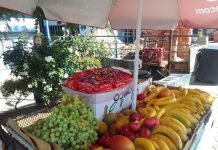Africa-Press – Lesotho. These targets would shape the China-Africa relationship for the forthcoming three years and beyond. Immediately after the Forum’s close, a flurry of headlines reported the ‘underwhelming’ $40bn financial commitment from China – a 33% drop in China’s total financial commitment when compared to the $60bn commitment made at the 2018 FOCAC.
The overall implication was that this year’s FOCAC reflected a weakening China-Africa relationship – consequent of Covid-19 and risky lending practices.
But the headlines missed a huge chunk of the picture – and were arguably premature, not taking into account the key negotiated documents agreed during the meeting.
Now, with all four documents having been officially published – a clearer picture is emerging that, in fact, the post-2021 Africa-China relationship may not just intensify but might become more African-led. Let’s talk about why first.
One key issue is that the narrative of a “weakening” has an implicit bias – an underlying assumption that both African countries and China itself are ‘high risk’ when it comes to financial lending and other relationships such as trade.
They posit that China is trying to swerve international criticism of ‘debt traps’ by cutting back on unsustainable lending practices to ‘risky’ African economies. Hence, a “cut” was an easy narrative to lead with.
But this thinking is not new – throughout the Covid-19 pandemic, there have been mounting claims of a pending ‘African debt crisis’ with China portrayed as the main perpetrator. Of course, this pre-dates the pandemic – in fact, it’s hard to think of a time ‘Africa’ was not believed to be in a so-called ‘debt crisis’!
This comes even though the majority of African countries retain debt-to-GDP ratios of under 50%, unlike many wealthy countries and that private commercial debt makes up the largest chunk of most African country’s debt portfolios.
So how was this narrative promulgated? It was partly through misanalysis. Whilst it is accurate that the overall financial commitments announced in 2018 totalled $60bn, in actual fact in 2018 only $15bn of this was earmarked in the form of loans and aid. It is this $15bn portion that has reportedly completely vanished this year.
However, when looking at the other broader new commitments made in the speeches – such as delivering ten regional connectivity projects together, or the 600 million vaccine donations from China – commitments which were not made in 2018 – the total value of these in financial terms could easily exceed $15bn.
Indeed, the regional connectivity commitment specifically is crucial and could be of significant value. The FOCAC Action plan rightly recognises the “persistent infrastructure gap” in Africa and commits to helping close the gap through concessional finance.
This is the right way to go. Regional infrastructure projects will be key to meeting African pre-Covid-19 growth goals, the external cost of which the AfDB estimate at up to $68bn to $108bn a year, even without taking account of climate change and post-Covid-19 recovery needs.
These needs can even be broken down by country. Let’s look at Senegal – FOCAC’s co-chair. According to the Global Infrastructure Hub, Senegal has a $19bn infrastructure investment gap. Breaking this down by sector, road infrastructure has a gap of $10bn, telecommunications $4bn, and energy $2.8bn.
The lack of infrastructure is reflected in the fact that 30% of the population lacks access to electricity – a clear barrier considering this FOCAC’s emphasis on fostering a digital economy across Africa.
Furthermore, regional infrastructure can be very costly. Even financing infrastructure within a country requires huge amounts of finance. Take Nigeria’s Lagos-Ibadan Railway for example.
Back in 2017, Nigeria received its largest loan of just over $1.2bn at concessional rates from China. The railway connects Lagos – Nigeria’s commercial and port city – to Ibadan, an industrial city to the north.
It is the first double-track railway in West Africa and cuts travel time to around two hours, reducing road traffic and facilitating trade within Nigeria. In a recent report, colleagues and I have suggested that projects such as this be scaled up at a cross-border level.
Extending the Lagos railway line to Benin’s capital Porto-Novo (just 88 kilometres away) or even further, to serve Togo and Ghana’s capital cities, and even further across the West coast, would facilitate cross border flows of goods and people, and create huge spill-over effects in terms of employment.
It’s these kinds of cross-country projects the continent needs to tackle infrastructure gaps – and projects like this could easily push the total costs of loans and grants over the next three years to over $15bn, and therefore total spending on the Africa-China relationship over the next three years over $60bn.
While this explanation pertains just to the financial elements of the conference outcome, as I and others in my firm have reported elsewhere, the fact is that other targets announced in speeches and the documents could also set China to be the top development partner across several sectors, including making China the continents top vaccine donator as well as supplier, Africa’s largest export destination, the largest investor in the continent, and providing the highest proportion of SDR reallocations to Africa.
When you look at FOCAC from this perspective, you can see that contrary to narratives of a weakening China-Africa relationship, the reality is that relations may well intensify over the coming years – as a result of both African and Chinese demands. This leads me to my final point – the outcomes of this conference indicate that the relationship is becoming more demand-led by Africans.
From support for African SMEs, utilising African financial institutions, and recognition of Africa’s Geographical Indications, these are all key developments pushed for by African negotiators – and reiterates our advice that when it comes to Africa’s relationship with China: if you don’t ask, you don’t get.
This enhanced space for African demands – African “agency” – is highly important for African governments, citizens and businesses to understand carefully.
Because while it does not fit with the “debt distress” narratives, it nevertheless creates a number of opportunities as well as challenges going forward.
In particular, if African stakeholders are going to take advantage of the aspirations expressed in FOCAC 2021, this is not a time to question “whose agency” within Africa we are talking about. Policymakers, businesses, think tanks and civil society must instead work harder towards common objectives than ever.
For example, priority lists of high-quality infrastructure projects at concessional rates that best encompass African needs need to be put together – projects that create jobs, generate profits, facilitate trade and cut supply chain costs.
Africans need to make proposals for where China’s $10bn SDRs can be allocated, to actively seek to promote African exports to China, design new fund structures that support SMEs, and much more.
Hence, contrary to the headlines, the issue is not that Africans have lost the ball. The issue is that the ball is in African courts and African stakeholders must make sure to play to Africa’s advantage.
For More News And Analysis About Lesotho Follow Africa-Press






